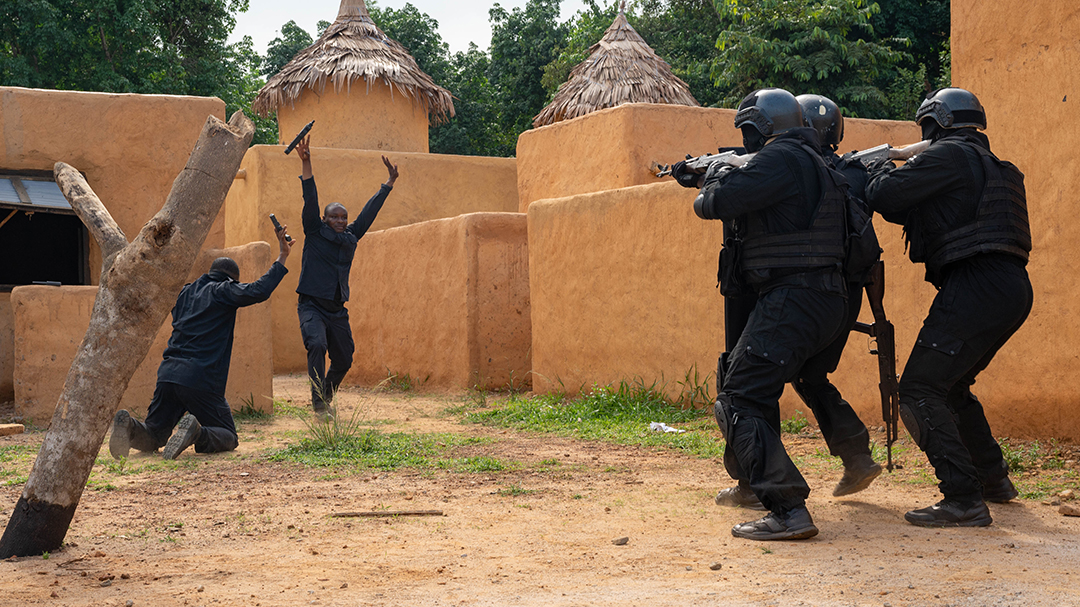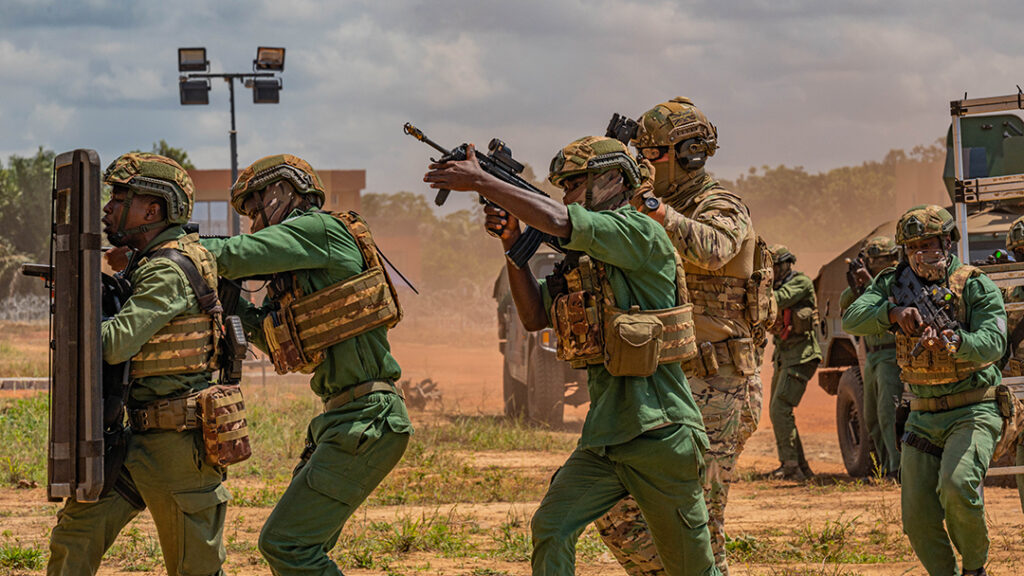A team of Humvees drove through a complex of buildings and screeched to a halt, leaving behind plumes of dust as Soldiers launched themselves out in unison. With precise coordination, they cleared buildings with flashbang grenades and assault rifles firing blanks.
The live-action sequence featuring a joint team of Ivoirian Special Forces and Rangers from the United Kingdom was one of the highlights of Exercise Flintlock, which began in Jacqueville, Côte d’Ivoire, on April 22 and concluded on May 14.
Flintlock has increased combat readiness and built trust among partner nations for 20 years, creating a strong front against shared threats. For this year’s host country, Cote d’Ivoire, the threat of terrorism looms large and necessitates a collaborative approach to counterterrorism operations. A longtime participant and four-time host of Exercise Flintlock, Cote d’Ivoire shares borders with Mali and Burkina Faso to the north, where well-organized terrorist groups backed by al-Qaida and the Islamic State group frequently attack.
In hosting Flintlock, Cote d’Ivoire provides leadership and expertise to help address the region’s counterterrorism goals, Ivoirian Special Forces commander Brig. Gen. Tibé Bi said.
“This event symbolizes the trust and cooperation between our nations in the fight against contemporary security threats,” he said before Flintlock 25. “Only a collective and coordinated approach will be able to provide effective and sustainable responses.”

More than 500 special forces Soldiers from 38 countries participated in the 20th edition of U.S. Africa Command’s special operations exercise Flintlock 2025. This year’s iteration of the exercise focused on strengthening cooperation on counterterrorism, crisis response and regional security in West Africa.
Ghana Armed Forces Brig. Gen. Timothy Tifucro Ba-Taa-Banah said exercises like Flintlock have proven to be useful for exchanging ideas, providing encouragement to one another and learning about new technology.
“The fact is that many African armies are exposed to quite a number of cultural variations,” he told ADF. “And when these kinds of exercises are organized, it’s an opportunity to see those differences and say, ‘Let’s see how we can improve interoperability and cohesiveness when it comes to fighting together.’
“The more we have multinational exercises, the better prepared we are to counter all sorts of threats that affect us collectively. I believe strongly the commitment from developing partners is there, and the commitment from the beneficiary institutions, so we hope to have more exercises.”
West Africa was well represented with 12 countries participating: Angola, Benin, Cabo Verde, Cameroon, Chad, Cote d’Ivoire, Gabon, Ghana, Mauritania, Nigeria, Senegal and Togo. Other militaries at Flintlock 25 included Algeria, Libya, Morocco, Somalia, Tanzania, Tunisia and Zambia.
Militaries participated in several scenarios designed to strengthen their collective abilities to counter violent extremist organizations, collaborate across borders, provide security and build trust with civilian populations. Flintlock 25 featured a multinational command team practicing counterterrorism operations in the air, on land and sea. It was coordinated in a command-post exercise working a tabletop mission that included high-casualty medical scenarios and simulated communications breakdowns with technical and language challenges.
Mentors from 10 countries engaged with more than 125 students from the École Militaire Préparatoire Technique in Bingerville during a civil-military event on April 30. They worked together on career mentoring sessions and organized a field day competition.
Flintlock 25 also bolstered information sharing between military and law enforcement organizations through an Interagency Fusion Cell (IFC), which conducted a drone crime-scene surveillance and negotiation technique training on May 10.
“The IFC is a multinational, interagency platform designed to centralize, enrich and analyze intelligence and operational information from partner nations,” Netherlands Police operational specialist Tibor Székely said after the exercise. “It acts as a critical hub for synchronizing efforts against terrorism, which is a threat that transcends borders, jurisdictions and agencies.
“In today’s threat environment, timely and accurate intelligence is vital. Military units, especially special operations forces, bring rapid response capabilities, while law enforcement contribute investigative authority, local knowledge and access to different streams of intelligence.”

